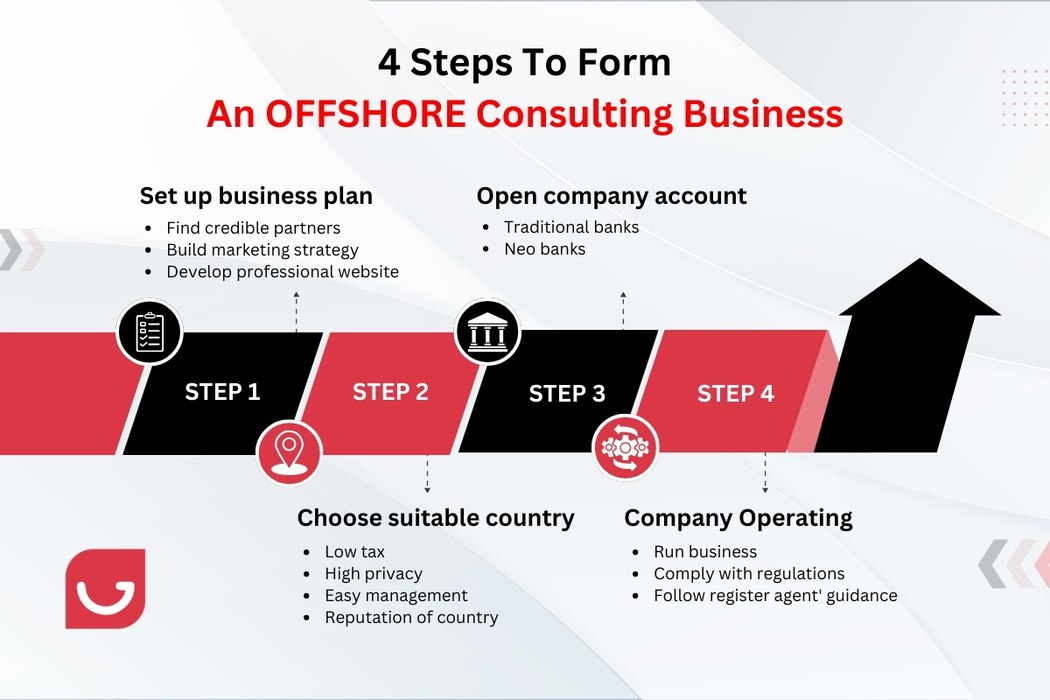Offshore Company Formations and AML/KYC Rules: Staying Legally Safe
Understanding Offshore Firm Formations: A Comprehensive Guide to the Refine and Benefits
Offshore business formations provide a tactical opportunity for entrepreneurs seeking to maximize their organization procedures. These entities usually offer benefits such as tax benefits, boosted privacy, and robust asset security. Understanding the details of selecting a jurisdiction, the formation process, and conformity requirements is important. As the landscape of international organization advances, the ramifications of developing an offshore firm warrant cautious factor to consider. What actions should one take to navigate this facility surface?
What Is an Offshore Firm?
An overseas company is a company entity integrated outside the territory of its owners' home, often in a country with beneficial governing and tax obligation atmospheres. These companies can offer different functions, including possession defense, global trading, and wealth management. They are usually developed in jurisdictions called tax obligation havens, where business tax obligation rates are reduced or missing, and personal privacy legislations are strict.
Offshore companies might be possessed by people or various other business entities and can operate in various industries, consisting of money, consulting, and e-commerce. While they offer specific benefits, the legal and regulative frameworks governing offshore companies differ considerably by territory. Company owner must browse these complexities to ensure compliance with both worldwide and local laws. Understanding the framework and function of overseas business is vital for people considering this alternative for organization operations or property administration.
Advantages of Creating an Offshore Business
While the decision to develop an offshore company might come from numerous calculated factors to consider, the possible benefits are compelling for numerous local business owner. One considerable benefit is tax obligation optimization; many offshore jurisdictions provide favorable tax rates or perhaps tax obligation exemptions, enabling companies to preserve even more earnings. In addition, offshore firms commonly offer enhanced privacy security, securing the identities of investors and directors from public analysis.

Finally, company owners may discover operational versatility, as offshore jurisdictions frequently have less governing obstacles, allowing structured administration and governance. Jointly, these advantages make overseas firm formations an eye-catching choice for numerous looking for to increase their company perspectives.
Picking the Right Jurisdiction
Choosing the suitable territory for an offshore company is an essential step in maximizing the benefits detailed earlier. Numerous factors influence this decision, consisting of tax laws, business legislations, and the overall service setting. Jurisdictions such as the British Virgin Islands, Cayman Islands, and Singapore are often preferred for their beneficial tax routines and robust legal frameworks.
It is crucial to consider the specific demands of business, such as privacy needs and regulative compliance. In addition, the simplicity of doing business, consisting of the effectiveness of company registration and financial facilities, plays a substantial role.
Prospective owners must also evaluate the political security and online reputation of the selected territory, as these components can impact long-lasting success. Eventually, comprehensive research and specialist appointment are advised to guarantee placement with the company's objectives and to utilize the full possibility of overseas benefits.

The Offshore Business Development Process
The offshore company formation procedure includes a collection of important steps that call for careful planning and implementation. Services or people should choose a suitable territory that aligns with their goals, taking into consideration aspects such as tax obligation benefits, personal privacy, and regulatory environment. Following this, the following step involves picking the appropriate organization structure, such as an International Service Firm (IBC) or Restricted Liability Business (LLC)
When the framework is figured out, necessary records, consisting of an organization strategy, recognition, and proof of address, must be prepared. Engaging a credible neighborhood agent or provider can simplify this phase, making sure compliance with regional regulations. After sending the needed paperwork to the pertinent authorities, the formation procedure usually culminates in the issuance of a certification of consolidation. This document develops the business as a legal entity, enabling it to perform organization internationally.
Lawful Needs and Conformity
Comprehending the legal needs and conformity obligations is important for anyone wanting to establish an overseas company. Each jurisdiction has particular policies that have to be followed, which can include business enrollment, obtaining needed licenses, and keeping neighborhood addresses. Offshore Company Formations. It is crucial to assign a registered representative that can facilitate communication with local authorities and warranty compliance with ongoing coverage needs
Additionally, many jurisdictions need the entry of annual monetary statements, together with tax filings, even if the business does not generate earnings. Investors and directors should be recognized, with due persistance treatments typically mandated to verify their identifications. Failing to fulfill these lawful commitments can cause fines or the dissolution of the business. Because of this, prospective overseas business owners must seek advice from lawyers experienced in international organization legislation to navigate these complexities successfully and ensure complete conformity with all regulations.
Tax Implications of Offshore Companies
The tax obligation implications of overseas firms existing significant benefits that attract lots of business owners. Understanding the associated conformity needs is essential for steering the intricacies of worldwide tax obligation regulations. This area will explore both the potential advantages and the needed Recommended Site obligations related to offshore service frameworks.
Tax Advantages Introduction
Although overseas companies are frequently checked out with uncertainty, they can supply considerable tax advantages for services and people seeking to optimize their monetary strategies. Among the key advantages is the possibility for lower corporate tax obligation prices, which can result in substantial cost savings. Many offshore jurisdictions supply favorable tax obligation programs, consisting of absolutely no or minimal tax obligation on profits, funding gains, and inheritance. Additionally, overseas business can facilitate international business operations by reducing tax responsibilities associated with cross-border deals. This structure might also make it possible for tax obligation deferral chances, permitting earnings to expand without instant tax. Ultimately, these advantages contribute to boosted monetary effectiveness and property security, making offshore firms an eye-catching alternative for smart investors and business owners.
Conformity Requirements Described
Offshore firms may provide tax obligation benefits, however they additionally feature a set of compliance needs that need to be very carefully browsed. These entities go through certain reporting commitments, which vary greatly depending on the territory. Generally, overseas business need to preserve exact monetary records and send annual monetary statements to follow neighborhood laws. In addition, many territories need the disclosure of advantageous possession to deal with cash laundering and tax obligation evasion. Failure to abide by these conformity measures can lead to serious charges, consisting of penalties and potential loss of company licenses. Recognizing the local tax legislations and global contracts is important, as they can affect tax obligation liabilities and overall functional legality. Engaging with lawful and economic experts is recommended to ensure complete compliance.
Keeping and Handling Your Offshore Business
Maintaining and taking care of an offshore business involves sticking to numerous recurring compliance needs important for lawful procedure. This includes diligent financial record keeping and an understanding of tax obligation obligations relevant to the company's jurisdiction. Effective monitoring not only assures governing conformity yet also supports the business's financial wellness and durability.
Recurring Conformity Requirements
Ensuring recurring conformity is crucial for any type of entity operating in the offshore industry, as failure to fulfill governing demands can bring about significant charges or also dissolution of the firm. Offshore companies must comply with regional regulations, which might consist of yearly filing of economic declarations, payment of needed costs, and preserving a registered office address. In addition, business are frequently called for to appoint a local agent or representative to promote communication with authorities. Normal updates on adjustments in regulation or tax obligation needs are important for conformity. Furthermore, adherence to anti-money laundering (AML) and know-your-customer (KYC) laws is crucial. By preserving arranged records and remaining educated, overseas firms can guarantee they remain compliant and minimize threats connected with non-compliance.
Financial Record Maintaining
Efficient monetary document maintaining is crucial for the successful administration of any type of overseas business. Preserving in-depth and exact economic documents help in tracking the business's performance, assuring conformity with neighborhood guidelines, and helping with educated decision-making. Business need to carry out systematic processes for documenting revenue, expenditures, Extra resources and transactions to produce openness and accountability. Making use of bookkeeping software application can simplify this process, enabling real-time monetary evaluation and reporting. Regularly assessing economic declarations assists identify trends, analyze productivity, and handle capital properly. Furthermore, it is essential to safely save these records to secure delicate information and warranty very easy accessibility throughout audits or monetary reviews. By focusing on careful economic record maintaining, overseas companies can enhance operational effectiveness and support long-term success.
Tax Responsibilities Review
Understanding tax obligation responsibilities is important for the proper administration of an offshore business, as it straight affects browse around these guys monetary efficiency and compliance. Offshore firms might go through numerous tax laws relying on their jurisdiction, consisting of company tax obligations, value-added taxes, and withholding tax obligations. It is important for entrepreneur to stay informed about their tax duties, as failure to comply can cause fines and legal concerns. Additionally, numerous overseas jurisdictions use tax incentives, which can substantially benefit organizations if navigated appropriately. Engaging an experienced tax obligation advisor or accounting professional focusing on global tax obligation law can aid guarantee that firms satisfy their obligations while optimizing their tax methods. Inevitably, diligent tax monitoring adds to the total success and sustainability of an offshore entity.
Often Asked Questions
Can I Open Up a Financial Institution Account for My Offshore Company From Another Location?
The capability to open up a bank account for an overseas business from another location depends on the financial institution's plans and the jurisdiction's regulations. Lots of financial institutions provide remote solutions, but specific demands may differ considerably in between organizations.
What Are the Costs Involved in Creating an Offshore Company?
The costs associated with forming an offshore firm normally consist of enrollment charges, legal and consulting expenditures, and ongoing maintenance charges. These expenditures differ considerably based upon territory, intricacy of business structure, and particular services needed.
Are There Restrictions on That Can Be a Shareholder?
Restrictions on investors vary by jurisdiction. Some nations might enforce limitations based upon residency, citizenship, or company kind - Offshore Company Formations. It's necessary for potential capitalists to research specific guidelines appropriate to their chosen offshore place
For how long Does the Offshore Firm Development Refine Generally Take?
The overseas firm formation process commonly takes in between a couple of days to a number of weeks. Elements influencing the timeline include territory requirements, file preparation, and responsiveness of pertinent authorities included in the registration process.
What Happens if I Fail to Conform With Local Laws?
Failure to follow regional legislations can cause serious charges, consisting of penalties, lawsuit, or loss of company licenses - Offshore Company Formations. It might additionally harm the business's credibility and impede future business chances in the territory
An offshore firm is a business entity integrated outside the territory of its owners' residence, commonly in a country with favorable regulatory and tax obligation atmospheres. One substantial advantage is tax obligation optimization; lots of offshore territories offer favorable tax prices or even tax obligation exemptions, permitting companies to keep more earnings. Overseas firms are usually seen with uncertainty, they can use significant tax obligation advantages for companies and people looking for to maximize their economic strategies. Furthermore, overseas firms can facilitate worldwide organization operations by reducing tax responsibilities connected with cross-border purchases. Offshore business might be subject to numerous tax obligation regulations depending on their jurisdiction, including business tax obligations, value-added tax obligations, and withholding taxes.